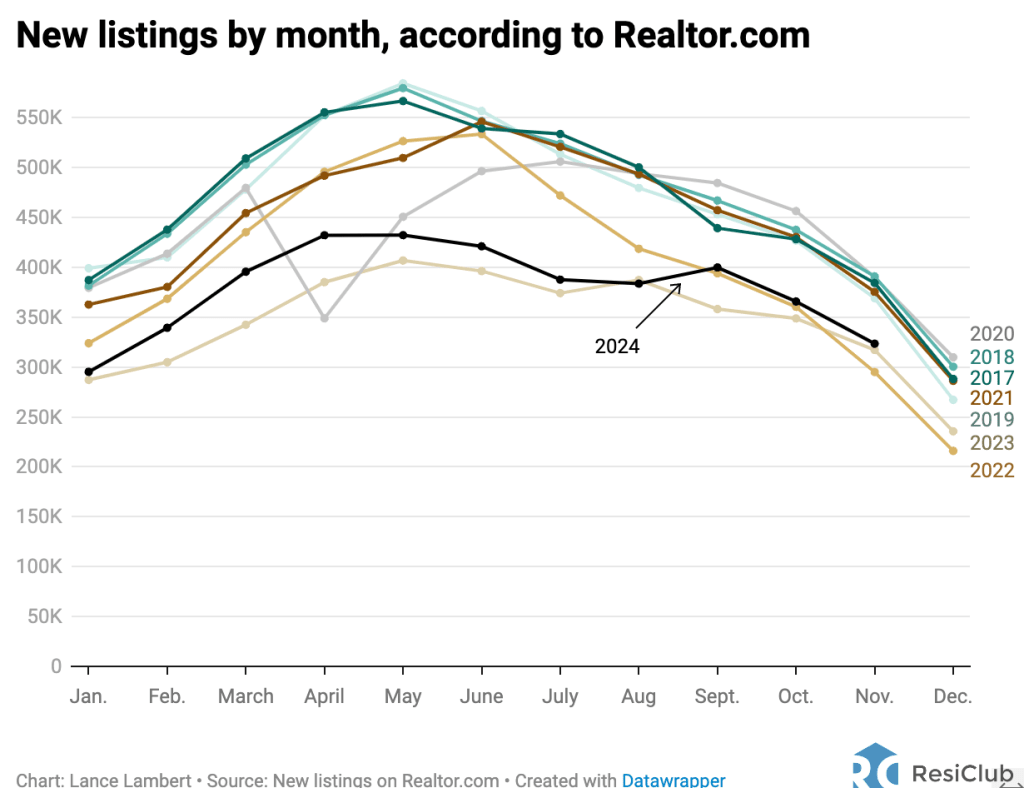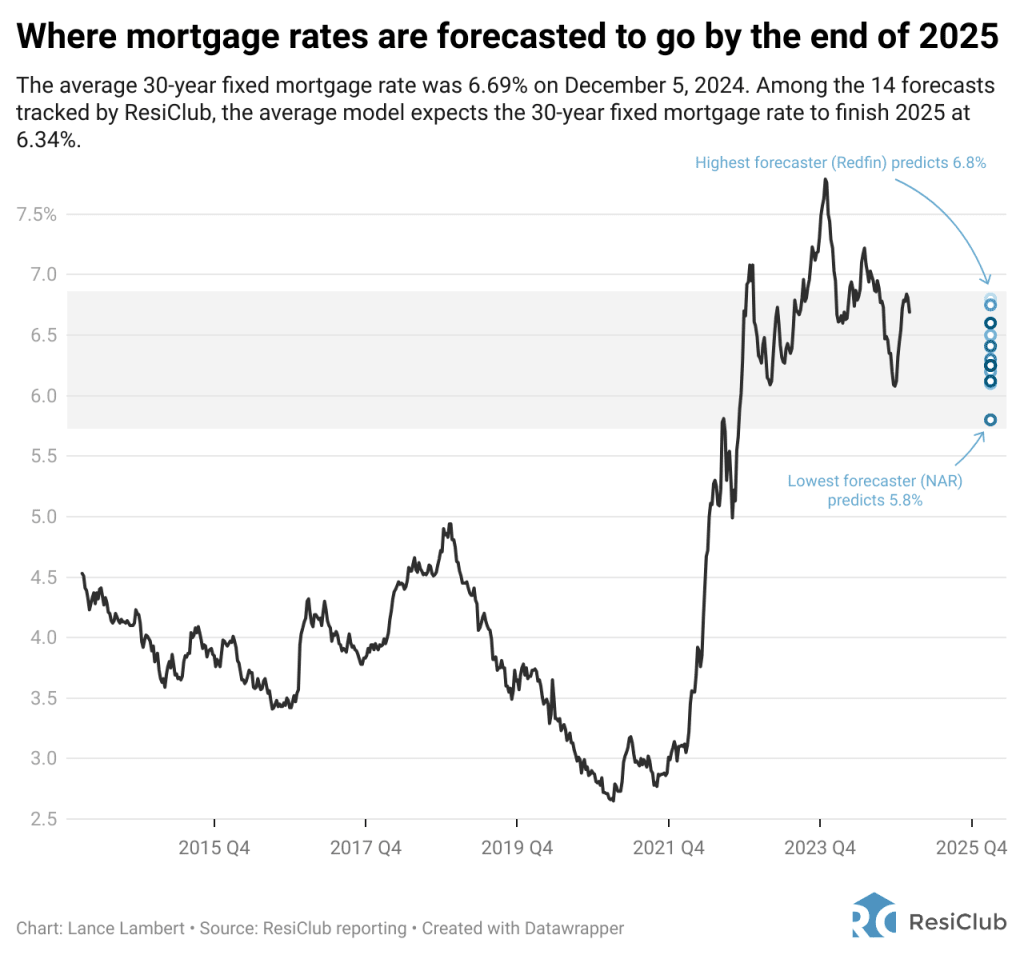Need extra housing market tales from Lance Lambert’s ResiClub in your inbox? Subscribe to the ResiClub newsletter.
Michael Zuber started constructing his rental property portfolio in Fresno, beginning along with his first properties in 2001. He bought off a lot of his actual property portfolio proper earlier than the 2008 housing bust after which reentered the market after house costs crashed.
By 2018, Zuber had grown his portfolio to greater than 170 rental properties and made the choice to go away his tech job in Silicon Valley to deal with his ardour for serving to others obtain related success. His YouTube channel, One Rental at a Time, has since amassed greater than 60,000 followers, most of whom are single-family landlords themselves.
Zuber research the monetary and housing market day-after-day and has turn out to be a number one voice within the mom-and-pop landlord space—which represents the most important share of rental-property homeowners within the U.S.
ResiClub‘s Meghan Malas just lately interviewed Zuber about his insights and strategy.
Rates of interest have gone up loads since early 2021, so a variety of institutional capital that was transferring into the house has pulled again. Nonetheless, we’re nonetheless seeing, on a share foundation, a superb variety of single-family landlord purchases from mom-and-pop single-family landlords. How are single-family buyers nonetheless discovering offers that pencil in such a market?
Mother-and-pop landlords have a bonus over Wall Avenue cash as a result of they’re way more nimble. They solely want to search out one property versus dozens, making it simpler in immediately’s setting to search out the needle within the haystack. Institutional buyers as of late deal with newer properties, usually lower than a decade previous, with three or 4 bedrooms.
Mother-and-pop landlords can goal properties that don’t match the institutional “purchase” field, discovering ugly ducklings or missed listings. And whereas establishments depend on expertise to question the marketplace for offers, mom-and-pop landlords community and consider offers regionally.
Again in June, a ResiClub-Groundfloor Housing Investor Survey discovered that 80% of actual property investor-landlords are involved about house insurance coverage shocks. What ought to single-family buyers be aware of on the insurance coverage entrance?
Insurance coverage has turn out to be a front-and-center concern for landlords. For over 25 years, I may estimate my insurance coverage prices inside $20 or $30. However within the final two years, we began going through nonrenewals and cancellations. In California, there was a interval when insurance coverage corporations had been leaving the market altogether.
For years, I had a fourplex the place insurance coverage was constantly round $1,900. When my supplier refused to resume, the following provider charged nearly $3,200 for a similar protection.
Fortunately, within the final six months, the speed shocks, cancellations, and nonrenewals appear to be easing. And in the event you’ve been within the recreation lengthy sufficient, you’ve probably benefited from important hire will increase between 2020 and 2023. Whereas insurance coverage prices may need jumped 50%, these hire will increase have usually outpaced them.
So long as you’re managing your models successfully, the upper insurance coverage prices—whereas they damage money move—are manageable.
You’ve mentioned earlier than that immediately’s housing market resembles that of the early Eighties—a time of considerably strained housing affordability within the U.S.—are you able to clarify why?
Between 1978 and 1982, we noticed a dramatic enhance in charges, which sharply decreased transactions. I made this name in 2022 proper after the Jackson Gap assembly, the place Jerome Powell primarily mentioned, “Ache is coming.”
In my 54-year spreadsheet, you may see the sample: From 1978 to 1981, present house gross sales transactions went down 50%, however the median house value went up.
In 2022, after I predicted a crash in housing transactions alongside rising [national home] costs, many dismissed it as silly. Sadly, that’s precisely what occurred.

Even earlier than present house gross sales—and new listings—plummeted in 2022, you mentioned that the “Fed broke the housing market.” What did you imply by that, and is that also true heading into 2025?
Historically, the housing market follows a standard cycle. First-time homebuyers buy a house, keep for six to eight years, after which transfer up. This cycle operated constantly for 40 years.
However take into account somebody who purchased an entry-level house in 2020 or 2021. Immediately, it’s probably they might not afford their present house as a result of its value enhance of 25% to 50%, not to mention commerce up for a greater house. The mathematics not works. The house they need to purchase is $100,000 dearer, and mortgage charges have jumped from 3% to 7%. In consequence, the “move-up purchaser” has successfully disappeared from the market.
The shortage of move-up patrons breaks the housing market as a result of their exercise represents two transactions—a sale and a purchase order. With out them, entry-level housing stays frozen. The properties promoting are higher-end or luxurious properties, which skews the market. Median house costs seem increased as a result of lower-priced properties aren’t [selling].
Evaluating what number of entry-level properties bought in 2019 or 2020 to gross sales in 2024 or 2025 reveals a major drop—round 30% fewer. That is what defines a damaged housing market.

What’s your outlook for the housing market in 2025?
My name for 2025 is actually “increased for longer.” Charges could be decrease on the finish of the yr than at the start, however on common, 7% appears probably.
Virtually nobody with a 3% mortgage on an entry-level house will commerce as much as a 7% price—it merely doesn’t make monetary sense. In consequence, 2025 will probably be one other gradual yr with low transaction quantity. I count on nationwide house costs to remain flat, rising by 1% or 2% in 2025.
I predict extra new house gross sales in 2025, however sq. footage will shrink. Builders are more likely to deal with smaller, entry-level properties.
I additionally consider the incoming administration will work to make housing building sooner and cheaper, presumably providing incentives for constructing entry-level housing. I don’t foresee any “free cash” first-time homebuyer packages. The very last thing the market wants is extra demand; we want provide. If such a program materializes, my name for 2025 can be unsuitable, as it could disrupt the present dynamics.
Many individuals see actual property as a approach to construct wealth for retirement, however they don’t need to handle properties without end. As somebody who as soon as owned over 170 leases, when did you determine to downsize, and the way did you intend your exit?
You don’t need to self-manage. From the start, [my wife and I] selected to put money into a market two and a half hours away whereas working demanding full-time jobs. Property administration was a necessity for us, so we discovered offers that might assist paying a ten% administration price.
Whereas we not pay 10% immediately, having property managers from Day One has helped cut back the operational stress of direct administration. That mentioned, managing the supervisor continues to be important. We’ve needed to hearth property managers, cope with theft, and oversee operations to make sure the whole lot ran easily.
Nonetheless, we’ve by no means spoken on to tenants, collected hire, or known as for repairs. We’ve at all times paid another person to deal with these duties.
As you strategy retirement, different issues come into play. For instance, must you promote older properties and use a 1031 alternate to accumulate newer ones? Newer properties sometimes require much less administration, which may considerably cut back complications. A 1031 alternate additionally permits you to consolidate a number of properties right into a single, higher-quality asset.
